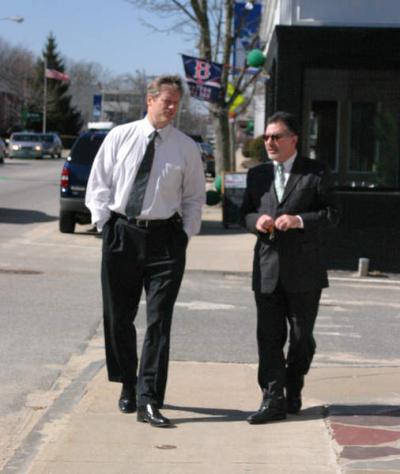Whistle-stop tour brings gubernatorial candidate to Wareham
Gubernatorial candidate Charlie Baker (R-Swampscott), stopped by Wareham on Wednesday, March 17, for a quick stroll down Main St. and a peek in Piper Beau's.
But the most notable part of the trip was the way he arrived: by train.
Cape Rail President and CEO John F. Kennedy and General Manager John T. Pearson accompanied Baker on a special excursion train from Middleborough to Buzzards Bay and back.
"Mr. Baker's office contacted us, and said they wanted to come down and meet the company management, learn about our needs, and see our facilities," said Pearson. "We decided the best way for him to take a tour of our facilities - given that our 'factory' is 70-miles long - was to take a train ride."
The trip began at the Capeway rail terminal in Middleborough owned by landscaping-materials supplier Sam White and Sons, one of the freight services' new customers. On the first run through town, the train stopped to pick up appetizers at Piper Beau's. Baker met Town Administrator Mark Andrews on the return trip, and the two chatted as Baker went to give his compliments to Piper Beau's.
Cape Rail operates two railroads. Mass Coastal Railroad currently provides freight service along tracks extending from Sandwich to Middleborough, including the energy train that delivers municipal solid waste to the SEMASS power plant for conversion into steam and electricity. Cape Cod Central Railroad operates excursion and dining trains throughout the summer. They will begin operating on Mother's Day.
Cape Rail has been developing plans for passenger "feeder" service that would extend passenger-rail service from the Middleborough MBTA station to Sandwich and, seasonally, to Hyannis. As proposed, the train would stop at the train station on Merchants Way in downtown Wareham and in Bourne five times a day, and it would cost passengers $11.75 to travel from Wareham to South Station in Boston.
Kennedy and Pearson had hoped to start the service this month in order to provide travel alternatives for residents who wanted to avoid the delays caused by construction on the Sagamore Bridge. However, the timeline was too short to obtain the necessary funding for locomotives and coaches, Kennedy said, especially for a service that did not connect two major-metropolitan areas.
Nevertheless, Pearson and Kennedy were still optimistic that passenger-rail service would eventually provide important economic development to the area.
"This [train trip] is the perfect way to demonstrate many of the transportation challenges that this region faces," Kennedy said. "It is at the 'end-of-the-line' of access to cities in a beautiful, predominantly rural area that needs improved transportation to grow the local economy. What better way to show that then by taking the train?"












